- Home
- Michael Grant
The Key Page 2
The Key Read online
Page 2
“These are holly and rowan. Superstitious folk believe they have magical properties.”
“Well, since this forest wasn’t here until, like, just now, I guess maybe they’re right,” Mack said.
Even though the day was weakly sunny, it was dark in the woods. The van rolled to a smooth stop on a bed of fallen leaves. The car rolled into a bush, sending birds squawking away in terror. The car jerked hard a few times. Then it emitted a disgruntled farting sound and finally stopped.
The window of the van rolled down again, and out flew things sparkly and golden: the ice-cream bar wrappers.
The door opened. The fairies did not step out; they flew, six of them in all.
Having by this time been in close contact with insectoid Skirrit, treasonous Tong Elves, and disgusting Lepercons, not to mention several horrifying monsters that Risky had morphed into, Mack was ready for just about anything. So it surprised him that the fairies looked almost exactly the way he expected fairies to look.
Three were male, three were female, and all had toned little bodies clad in earthy colors. They had double wings, like dragonflies, that made a buzzing sound (again, like dragonflies) as they flew. They were all roughly the same size, each maybe half a kid in height. Or at least half a Mack. Maybe a third of a Stefan.
The surprise was not in their look: these were definitely garden-variety, standard-issue fairies. The surprise came when they opened their mouths.
“I’m Frank. This is my crew: Joey, Connie, Pete, Ellen, and Julia.”
“These are not proper fairy names,” Dietmar observed.
Frank squinted. “What are you, the fairy police? Our names are whatever we say they are.”
But Dietmar wasn’t having it. “A fairy should be named after a flower or a tree, or something in the natural world.”
“And a kid should learn to keep his mouth shut,” Frank snapped. And with that, he drew what had at first looked like a small sword hanging at his side. It turned out to be a droopy sort of wand.
“You like flowers? Be one,” Frank said. He waved his wand and said, “E-ma exel strel (click)haka!”
“That’s Vargran!” Jarrah said.
And Dietmar probably would have agreed except for the fact that his body had turned green and very thin. Tubular, one might even say. His arms flattened into graceful leaves. And his head formed first a tight, green bulb and then exploded outward as the petals of a magnificent-looking sunflower.
From the seedpod at the center, Dietmar’s two eyes stared in shock. Frank did not seem to have bothered to give him a mouth.
Mack was torn between terror—understandable—and a feeling of glee—also understandable but not really admirable.
Xiao’s eyes narrowed, and already blue scales were covering her body as she—
“Uh-uh-uh!” Frank warned, shaking his finger. “That would be a bad move, dragon girl. Your kind signed a treaty a long time ago. This is western dragon territory.”
Reluctantly Xiao melted back to purely human form.
“Now, can we talk business?” Frank asked.
“You have to change Dietmar back to normal,” Mack demanded, somewhat forcefully, almost as though he meant it.
“When we’re done talking business.”
“Okay, what business?”
Frank shot a coy look at his crew, who fluttered slightly, then settled toward the ground. The instant their bare toes touched the lush grass, their wings rolled up. Like rolling up a window shade. Just rolled up. Whap.
“We hear you’re looking for someone,” Frank said.
They were, in fact, looking for the Key. The Key to Vargran spells and curses. So far they’d found bits and pieces of Vargran, but now, as they neared the fateful confrontation to save the world from the Pale Queen, they needed more. A lot more. And the Key was … um … the key.
That’s right: the Key was the key.
The Key had two parts. The first had been given to them by Nott, Norse goddess of night. And if you believed Nott (and seriously, how could you not believe a mythical Norse goddess?), the second and final part of the Key had been buried with one William Blisterthöng MacGuffin.
“Maybe,” Mack said cautiously.
“No maybe about it, kid. You’ve been asking around about someone no one has seen in a long time. We have good sources.”
Mack glanced at his companions. Jarrah shrugged.
And Mack’s iPhone chimed with the tone it used to signal a message.
Mack ignored it, but it was an edgy sort of ignoring, like he was forcing himself to ignore it, which just made everyone uncomfortable, and finally Frank said, “Oh, just go ahead and get it.”
With an abashed smile, Mack pulled out his phone.
“Well? What is it?” Xiao asked impatiently.
Mack sighed. “It’s my golem. He’s refusing to shower in the boys’ locker room.”
“Lotta dudes are bashful about that,” Stefan said, and no one thought he was talking about himself because Stefan was incapable of bashfulness.
“It’s not about being shy,” Mack said with a sigh. “He’s made out of mud. That much water …”
“Kind of busy here,” Frank interrupted impatiently. “Anyway, it’s best not to coddle golems. They just get needy.”
“I’ll just take a minute to …” His words faded out as he thumbed in a response:
* * *
You have got to handle these things yourself. You have got to be a big boy now.
* * *
“Sorry,” Mack said of the interruption. “You were saying?”
“We were saying you’re looking for someone who’s been gone a long time.”
“Let’s say we are,” Mack conceded. In the back of his mind he was wondering whether he’d been too harsh with the golem.
“Well, the someone you’re looking for is hidden by fairy enchantment. Been hidden for more than a thousand years.”
“Are we talking about the same man?” Jarrah asked.
“If it’s William Blisterthöng MacGuffin, then we are talking about the same man,” Frank confirmed. His eyes narrowed and his sharp little fairy teeth showed behind tightened lips. “And you’ll never find him. Never! Never … without our help.”
“Why would you help us?” Mack asked.
Frank shrugged. “A friend of ours wants something in return. Something you might be able to get for her. One hand washes the other. I scratch your back, you scratch mine. Tit for tat.”
“Can we stop being cryptic, please, and get to the point?” Xiao asked politely. “My friend is not happy as a flower.”
Dietmar was unhappy with good reason—a pair of crows came swooping down and lit on Dietmar’s huge petals and began to pick at the seeds.
“Hey, hey, get out of here!” Jarrah waved them off, but they retreated only as far as a low tree branch and from there kept a close eye on Dietmar’s sunflower seeds.
“You tell the tale, Connie—you tell it best.” Frank indicated one of the female fairies, a dark-haired, dark-eyed, tiny little beauty in a deep-green formfitting outfit.
“How do you suppose MacGuffin came to be called Blisterthöng?” Connie asked rhetorically in an enchanting fairy voice. She kind of writhed or danced as she spoke. It was a sort of dramatic interpretation: she used sweeping hand gestures, and sometimes lowered her head in sadness, or threw open her arms to show joy. “For many long years after the Romans left, and after the druids faded, and as the new faith was coming to Scotland, the fairies lived in peace. We are a peaceable folk. No fairy has ever raised a hand in violence against another!” She made a very dramatic upraised-fist move on that last line.
Mack nodded thoughtfully because that seemed like the thing to do.
“Except for the Seventeen Year War,” Pete the fairy interjected.
“And the War of the Sweltering Cave,” Julia added helpfully. “And the Rabid Peace of Kilcannon’s Bluff.”
“With those few exceptions, no fairy had ever raised a hand
in violence against another,” Connie reiterated, again with the upraised fist of forcefulness. “Unless you’re going to count the Battle of the Pretenders.”
“Or the Flaming Disagreement,” Frank said.
“Or the Pantsing of Fain’s Firth.”
“Or the Castle-Whacking Unpleasantness.”
“Or O’Toole’s Tools of Terror.”
“Or the War of the Noses.”
They went on like this for quite a while. And Mack began to wonder if the fairies were exaggerating their peacefulness.
“Or the Frightful Fruit Fight.”5
“Or Little Dora’s Comeuppance.”
Finally, after about ten minutes, they ran out of wars, skirmishes, misunderstandings, slaughters, backstabbings, and murdering peaces, and Connie got back to her main theme, which was, “Aside from those few6 minor matters, no fairy has ever raised a hand in violence against another.”
Fist for emphasis.
“Until …,” Frank interjected with great drama and a dramatic flourish of his wand.
“Until William MacGuffin stole the Key and used it to take sides with the fairies of clan Gorse against clan Begonia.”
A strangled sound—much like a high-pitched human voice coming from inside a flower—came from the giant sunflower. Lacking lips, tongue, or teeth, Dietmar had a hard time expressing himself clearly, but it was something like, “See! I told you so. Those are flower names!”
Mack ignored him and waited for Connie to finish her story.
The crows looked speculatively, wondering if they could make a quick in-and-out dash. Some seeds, maybe a little eyeball …
“MacGuffin wanted gold, and as you know, fairies have plenty of it,” Connie said. “So for thirty pieces of gold MacGuffin gave the Gorse King new and more dangerous Vargran curses. Curses that gave the Gorse King power over the Begonias and our beloved All-Mother.”
“Is there any way we can hurry this along?” Jarrah complained. “I’m beginning to regret we didn’t eat those ice-cream bars ourselves.”
“MacGuffin helped the Gorse to formulate a terrible, terrible curse.” Connie made an interesting move here, jabbing her hands forward away from her mouth, like stabbing finger-tongues. “It was a curse that caused a hideous rash in the form of rose thorns to grow in the sensitive parts of a fairy body.”
“Yeesh,” Mack said, and winced.
“Ah,” Xiao said, nodding her head almost as smugly as Dietmar sometimes did. “Hence the name Blisterthöng.”
“For a thousand years we of clan Begonia have thirsted after his blood so that we might have our revenge,” Frank said, shaking his little peace-loving fist and baring his sharp peace-loving teeth.
“Because of your peaceful nature and all,” Mack said dryly. “We thought MacGuffin was dead. It’s been a thousand years.”
“No, he’s not dead. He’s concealed by a powerful spell of the Gorse King. His castle is invisible to human eyes. Only those with the enlightened puissance—and few humans possess it—can see him or his castle.”
“That’s why you need us.”
“Yes, Mack of the Magnifica. You and these others—but not you,” Frank said, pointing out Stefan, who shuffled in embarrassment, “possess the enlightened puissance. I can make it possible for you to see the Concealed Castle of MacGuffin. And I can make it possible for you to see the All-Mother, whom only a few have seen before. And even fewer have photographed. You must take the Key from MacGuffin. And you must swear to free the All-Mother from the Gorse King’s spell.”
“Wait, I’m losing track,” Jarrah said. “This All-Mother of yours has the Blisterthöng rash?”
The fairies looked at her like she was an idiot. Which Mack thought was unfair since he had wondered the same thing.
“No. Duh,” Frank said. “She’s trapped in the body of a sea serpent.”
It took a moment for the reality to percolate up through Mack’s brain. Don’t blame him for being a little slow. He was very bright, and very attentive, but already the day had involved near death-by-car-accident and a vanful of fairies. So if he was a little slow, hey, give him a break.
“Are you talking about the Loch Ness monster?” Mack asked.
Frank bridled a bit at that, unfurled his wings, and rose a few feet into the air. “She is Eimhur Ceana Una Mordag, All-Mother to clan Begonia, as well as Beloved of the Gods, the Ultimate Warrioress, and a past holder of the record for longest sustained note on the bagpipes—they say many who heard were driven mad.” Then he settled himself down and, with a shrug, said, “But yes, most know her as the Loch Ness monster.”
“Well then,” Jarrah said briskly, “magic castle, some old dead fart who makes fairies get rashes, and the Loch Ness monster: all in a day’s work.”
* * *
Three
* * *
MEANWHILE, AT RICHARD GERE MIDDLE SCHOOL7
The golem stared at the phone. The message from Mack was very clear.
* * *
You have got to handle these things yourself. You have got to be a big boy now.
* * *
Yes. As usual, Mack had the right answer.
It was amazing, really, how right Mack was about, well, everything.
Clearly if the golem was a “big boy” then he could survive the shower. How much bigger? That was the question.
The golem began to text this question to Mack, but then stopped himself. You have got to handle these things yourself.
Yes, that was true, he supposed: responsibility. He would have to work it out himself.
Morning at school was always a confusing time for the golem. There were so many kids rushing this way and that, many saying, “Hi,” or, “Hey, weirdo,” or, “Get out of my way, you freak.” He tried to be pleasant to each and smile or say, “How are you today?” But it was hectic. Especially on days when Matthew Morgan would chain him to the bike rack or Camaro Angianelli would throw him into the bushes.
The golem didn’t quite understand what was going on—he was passing as Mack but he didn’t quite have Mack’s brains—but it seemed there was a sort of bully war going on at Richard Gere Middle School.8 Since Mack had left and taken Stefan Marr with him, the carefully negotiated bully peace had broken down.
Stefan had enforced peace among bullies by working out a complex system of assigned victims. Thus, under Stefan’s regime, there had been a bully for nerds, a bully for geeks, a bully for stoners, a bully for emo kids, a goths’ bully, a skaters’ bully, a rich kids’ bully—each bully with his or her own population of victims.
And of course one bully to rule them all, one bully to bind them, one bully to bring them all and in the darkness pound them. Which would be Stefan.
That system had worked surprisingly well. It kept kids from being “overbullied.” It wasn’t like just any bully could push a nerd around—only the designated bully of nerds could do that. And Stefan had established some limits. He had even conducted a bullying seminar, laying out what was and what was not acceptable bully behavior.
Yep. Those were the good old days.
Now, with the King of the Bullies off saving the world with Mack, everything was chaos. Suddenly bullies were trying to expand beyond their usual victim group. The emo bully had tried to claim that anyone who went to Hot Topic was, by definition, one of his rightful victims. This was opposed strongly by Ed Lafrontiere—the current Twilight fans’ bully—and this had set off a power struggle as various bullies tried to take over the title of King of the Bullies (or in the case of Camaro Angianelli, Queen).
Somehow the intrabully war had resulted in a sort of competition to see who could be the biggest bully to Mack. Or in fact: the golem.
His mom usually drove him to school in the morning. If by his mom, you meant Mack’s mom. The golem didn’t really have a mother, or a father. This was the first time in his brief life he’d had any sort of family, and they weren’t really his.
The golem had been formed and given life by Grimluk. He had sudd
enly opened his eyes in a tiny stone house on a distant hillside in … well, now that he thought about it, the golem wasn’t really sure where it was. Not around here, anyway.
He had begun to achieve consciousness when his head was formed. He had opened his eyes to see Grimluk’s ancient, grizzled, wrinkled, rheumy-eyed face staring down at him. Grimluk’s gnarled fingers had literally smoothed the mud that made the golem’s forehead.
The golem had blinked and looked around, confused. He was in some ways no different from a newborn baby.
He had looked down to see that his body was nothing but some tree branches—bark still on for better mud adherence9—tied together with rattan to form a sort of bare scarecrow form.
There was a massive wooden tub full of mud. And a smaller crockery pot with more sticks and loops of rattan.
“I’m getting too old for this,” Grimluk had muttered.
“Mama?” the golem had asked, gazing up hopefully.
“No, fool. You’re a golem. You have neither father nor mother. You have a maker. That’s me.”
“I … I feel like … like we should hug,” the golem had said.
Grimluk had been somewhat taken aback by this. But after he’d harrumphed a bit and chewed on his lip and forgotten what he was doing a few times and made some grunting noises and scratched and hitched up his robe, he’d finally said, “Eh? Let’s shake hands.”
Then after Grimluk had packed mud onto the golem’s stick arm and stuck in five twigs to act as supports for fingers and then carefully formed the hand, the golem had shaken hands with his maker.
“What’s my name?” the golem had asked.
“You don’t have one. Until I place the scroll in your mouth—and then you’ll know what part you are to play in the great events that rush toward us like an enraged boar.”
“What’s an enraged boar?”
“An angry wild pig.”
“What’s a pig?”
Grimluk was not a great teacher. The golem never did find out what a boar was. But Grimluk was a good golem maker.

 Fear
Fear Plague
Plague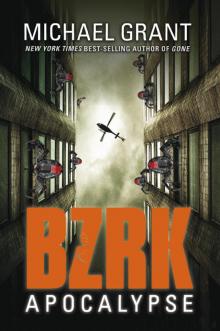 BZRK: Apocalypse
BZRK: Apocalypse Bzrk
Bzrk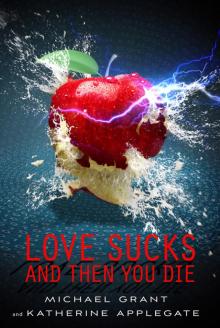 Love Sucks and Then You Die
Love Sucks and Then You Die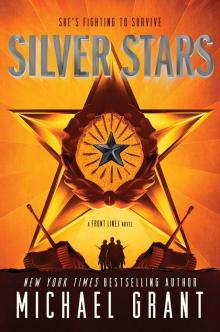 Silver Stars
Silver Stars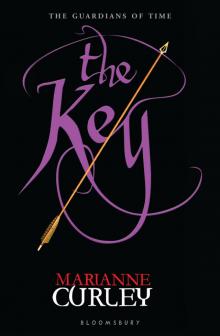 The Key
The Key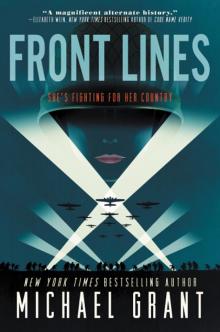 Front Lines
Front Lines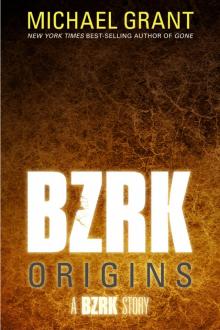 BZRK Origins
BZRK Origins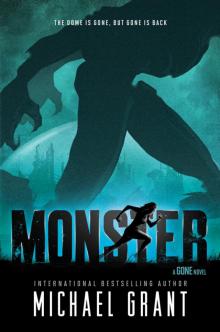 Monster
Monster Gone
Gone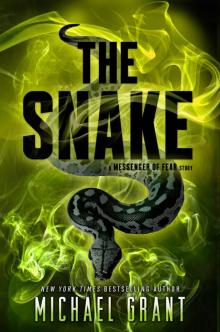 The Snake
The Snake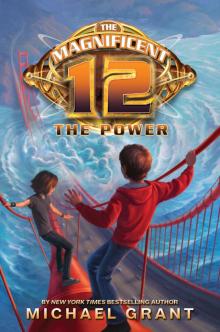 The Power
The Power Hunger
Hunger Lies
Lies A Sudden Death in Cyprus
A Sudden Death in Cyprus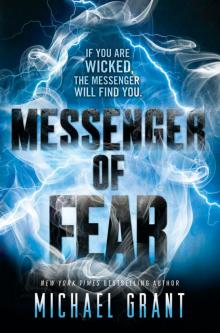 Messenger of Fear
Messenger of Fear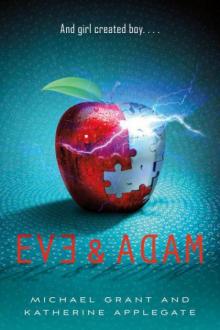 Eve & Adam
Eve & Adam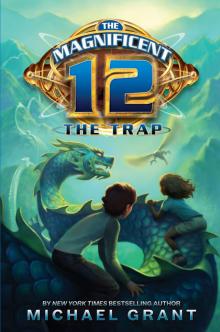 The Trap
The Trap Light
Light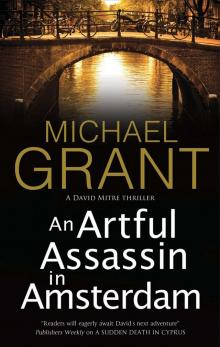 An Artful Assassin in Amsterdam
An Artful Assassin in Amsterdam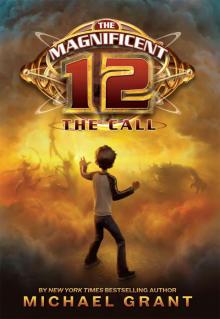 The Call
The Call Hero
Hero Soldier Girls in Action
Soldier Girls in Action Purple Hearts
Purple Hearts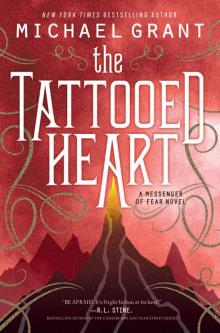 The Tattooed Heart
The Tattooed Heart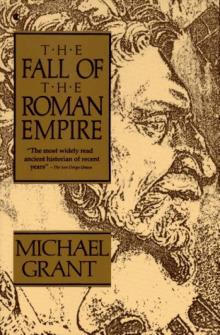 The Fall of the Roman Empire
The Fall of the Roman Empire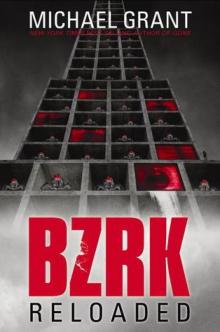 BZRK Reloaded
BZRK Reloaded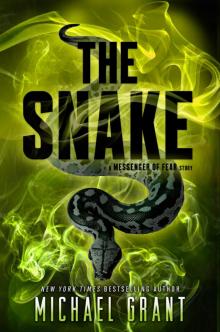 Messenger of Fear Novella #1
Messenger of Fear Novella #1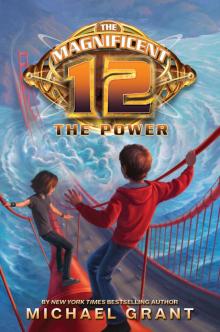 The Magnificent 12
The Magnificent 12 Fear: A Gone Novel
Fear: A Gone Novel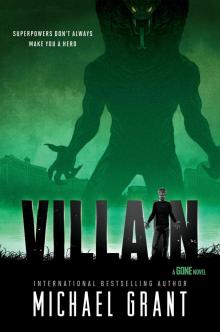 Villain
Villain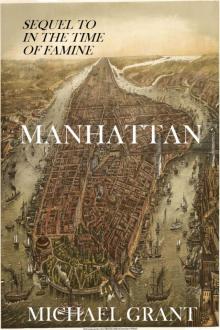 Manhattan
Manhattan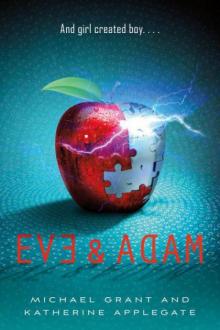 Eve and Adam
Eve and Adam Plague: A Gone Novel
Plague: A Gone Novel Fergie Rises
Fergie Rises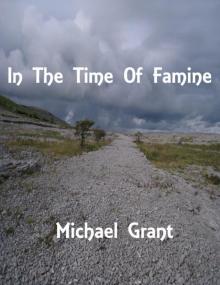 In the Time of Famine
In the Time of Famine Hunger_A Gone Novel
Hunger_A Gone Novel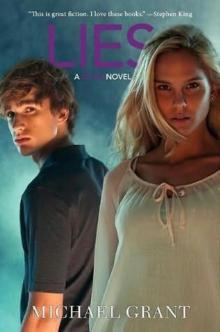 Lies g-3
Lies g-3